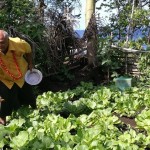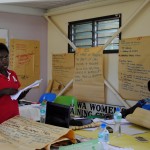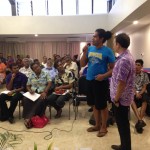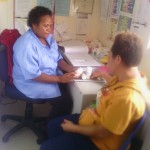
Mafuatu Taulelei is the chief of Vaipu’a, a village on the southwest coast of Samoa's Savai’i island. Like many villages in Samoa, the people of Vaipu’a have relied on town markets to feed their families; but rising sea levels, cyclones and extreme rainfalls are harming agriculture and fishing, and resulting in food shortages.

Angeline Kobuko, a young woman from the Bana district of Bougainville, Papua New Guinea, is the youth president of her community. A strong leader, she represents the voice of the youth at district meetings on pressing issues, such as violence prevention.
A natural disaster is 30 times more likely to occur in the Pacific Islands than in the United States. Floods, droughts, tropical cyclones and other extreme weather events have forced people to cope with the devastating effects of a changing climate. Many of the region’s villages have not developed formal disaster response training, leaving families unprepared to survive catastrophic events.

Following elections last fall, USAID, the International Foundation for Electoral Systems (IFES) and the International Republican Institute (IRI) trained elected officials to engage with citizens, especially with marginalized people representing rural communities, youth, women, LGBT (lesbian, gay, bisexual and transgender) populations, and persons with disabilities. The same populations were trained to communicate with elected officials.

Treating patients with HIV/AIDS in Papua New Guinea is complex. Those who carry the disease also carry the burden of social stigma. By the time an infected individual finally braves a visit to a clinic, they may be very sick.







Comment
Make a general inquiry or suggest an improvement.